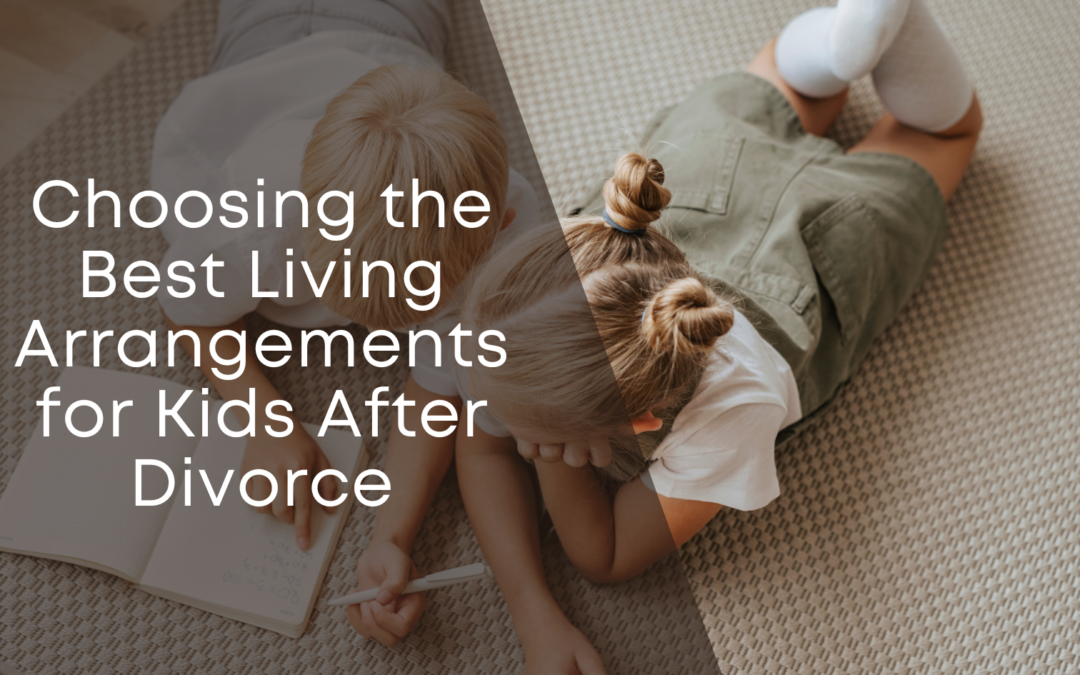Divorce is never easy, and when children are involved, the stakes are even higher. Imagine this: you’ve just finalized your divorce, and now you’re faced with one of the most critical decisions of your life—deciding on the best living arrangements for your children. You want to make the right choice, but the overwhelming options and potential consequences keep you awake at night. You’re not alone. Many parents are in the same boat, struggling to navigate this complex issue. But what if I told you there’s a way to ensure the best possible outcome for your kids?
The Central Problem
Divorce disrupts more than just your life; it turns your children’s world upside down. The problem of deciding on living arrangements is multi-faceted, affecting not just where your children will sleep at night, but also their emotional and psychological well-being.
The immediate concern is the logistics of custody and living arrangements. Who gets the children, when, and for how long? Studies show that children of divorce are at risk of experiencing emotional and behavioral issues. According to the American Psychological Association, nearly 50% of all marriages in the United States end in divorce, and of these, about 40% involve children.
As a parent, you’re battling feelings of guilt, confusion, and worry. You’re torn between wanting to be with your children and knowing that your ex-spouse also has the right to see them. The emotional toll can be overwhelming, making it hard to think clearly and make the best decisions. It feels fundamentally unfair that your children, who didn’t ask for this upheaval, must suffer because of the decisions of adults. They deserve stability, love, and support, but the fear of making the wrong choice looms large. It shouldn’t be this hard to do what’s best for them.
But it doesn’t have to be this way. There is a path that can lead to a better outcome for everyone involved.
A New Way Forward
My name is Steven Unruh, and I’ve been a divorce mediator for over 30 years. I’ve seen countless families struggle with these decisions, and I care deeply about helping parents like you find the best solutions for their children. I’m here to provide you with guidance and practical advice on how to navigate this challenging time.
1. Consider Mediation
One of the best ways to determine living arrangements is through mediation. Divorce mediation offers a collaborative environment where both parents can discuss and agree on the best arrangements for their children. This approach can be less adversarial than court battles, leading to more amicable outcomes.
2. Prioritize Stability
Children thrive on routine and stability. When deciding on living arrangements, try to minimize disruptions to their daily lives. This means keeping them in the same school, maintaining their extracurricular activities, and ensuring they have a consistent schedule. Studies indicate that stability helps children adjust better post-divorce.
3. Focus on Communication
Clear, honest communication with your children about the changes can alleviate their fears and anxieties. Explain the situation in age-appropriate terms and reassure them that both parents love them and will continue to be actively involved in their lives. Open dialogue helps build trust and emotional security.
4. Be Flexible and Fair
While it’s important to establish a consistent schedule, flexibility is also crucial. Be willing to adjust arrangements as needed to accommodate your children’s needs and your co-parent’s schedule. Fairness and cooperation can prevent conflicts and foster a healthier co-parenting relationship.
5. Seek Professional Help
Don’t hesitate to seek the help of a child psychologist or family therapist. Professionals can offer valuable insights and strategies to help your children cope with the changes. They can also provide support to parents, helping you navigate your emotions and make informed decisions.
Addressing Objections
You might be thinking, “This sounds good, but my ex is impossible to deal with,” or “Mediation won’t work for us; we can’t agree on anything.” These are valid concerns. However, skilled mediators are trained to handle high-conflict situations and can help bridge communication gaps. Remember, the goal is to find the best solution for your children, and sometimes that means putting aside personal differences and focusing on their needs.
Call to Action
It’s time to take action and ensure your children’s well-being. Imagine a future where your children feel secure, loved, and well-adjusted despite the divorce. By choosing mediation, prioritizing stability, maintaining open communication, being flexible, and seeking professional help, you can create a positive environment for them.
Schedule a consultation with me, Steven Unruh, today. Let’s work together to develop a living arrangement that serves the best interests of your children and brings peace to your family. Your children deserve the best, and you have the power to give it to them. Contact me now to take the first step towards a brighter future for your family.


Recent Comments